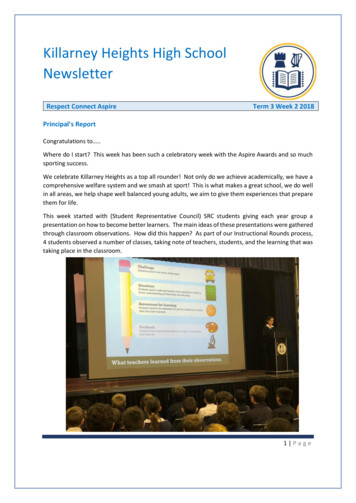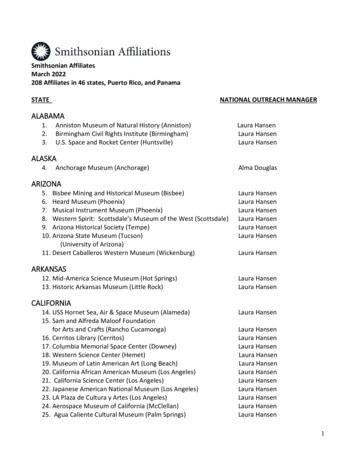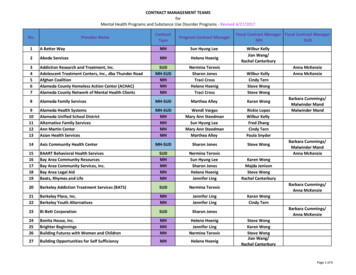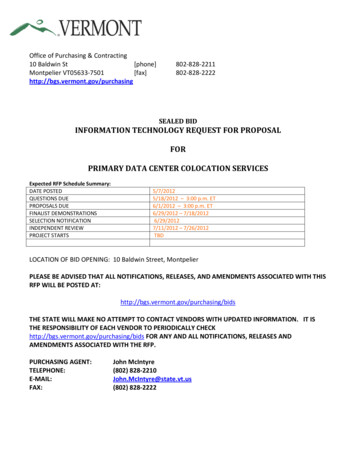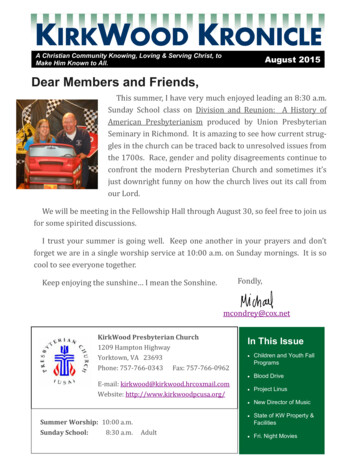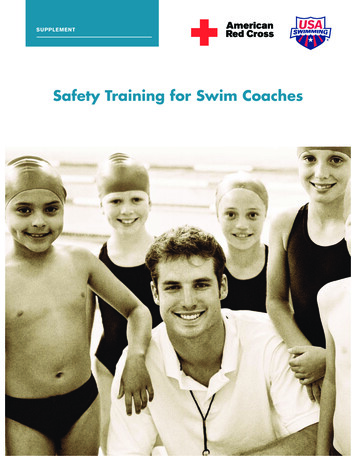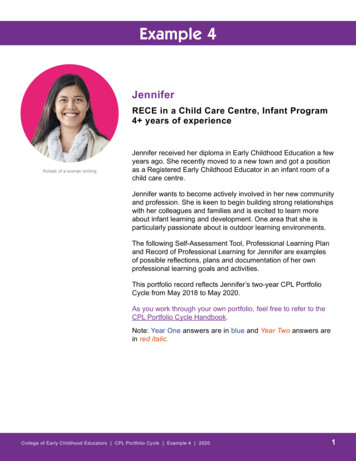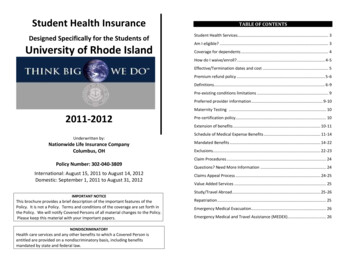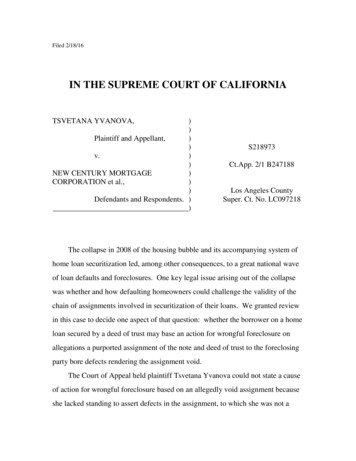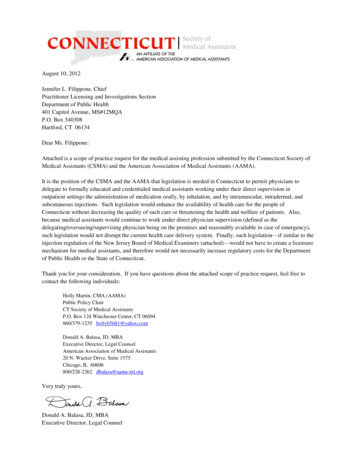
Transcription
August 10, 2012Jennifer L. Filippone, ChiefPractitioner Licensing and Investigations SectionDepartment of Public Health401 Capitol Avenue, MS#12MQAP.O. Box 340308Hartford, CT 06134Dear Ms. Filippone:Attached is a scope of practice request for the medical assisting profession submitted by the Connecticut Society ofMedical Assistants (CSMA) and the American Association of Medical Assistants (AAMA).It is the position of the CSMA and the AAMA that legislation is needed in Connecticut to permit physicians todelegate to formally educated and credentialed medical assistants working under their direct supervision inoutpatient settings the administration of medication orally, by inhalation, and by intramuscular, intradermal, andsubcutaneous injections. Such legislation would enhance the availability of health care for the people ofConnecticut without decreasing the quality of such care or threatening the health and welfare of patients. Also,because medical assistants would continue to work under direct physician supervision (defined as thedelegating/overseeing/supervising physician being on the premises and reasonably available in case of emergency),such legislation would not disrupt the current health care delivery system. Finally, such legislation—if similar to theinjection regulation of the New Jersey Board of Medical Examiners (attached)—would not have to create a licensuremechanism for medical assistants, and therefore would not necessarily increase regulatory costs for the Departmentof Public Health or the State of Connecticut.Thank you for your consideration. If you have questions about the attached scope of practice request, feel free tocontact the following individuals:Holly Martin, CMA (AAMA)Public Policy ChairCT Society of Medical AssistantsP.O. Box 124 Winchester Center, CT 06094860/379-1235 hollyb5681@yahoo.comDonald A. Balasa, JD, MBAExecutive Director, Legal CounselAmerican Association of Medical Assistants20 N. Wacker Drive, Suite 1575Chicago, IL 60606800/228-2262 dbalasa@aama-ntl.orgVery truly yours,Donald A. Balasa, JD, MBAExecutive Director, Legal Counsel
031323334353637383940Scope of Practice Request for the Medical Assisting Profession in ConnecticutSubmitted to the Connecticut Department of Public Health Pursuant to Public Act No. 11-209Submitted by the Connecticut Society of Medical Assistants and the American Association ofMedical AssistantsAugust 10, 2012Holly Martin, CMA (AAMA)Public Policy ChairConnecticut Society of Medical Assistants860/379-1235 hollyb5681@yahoo.comDonald A. Balasa, JD, MBAExecutive Director, Legal CounselAmerican Association of Medical Assistants800/228-2262 dbalasa@aama-ntl.org(A) Plain language description of the requestBackground: Medical assistants are allied health professionals educated and trained to work inoutpatient settings (e.g., medical offices and clinics) under direct physician supervision. Directphysician supervision is defined in the laws of other states as the overseeing/delegating/supervisingphysician being on the premises and reasonably available, although not necessarily in the sameroom. Medical assistants do not work under general physician supervision, as do physicianassistants and nurse practitioners, and are not educated and trained to work without direct physiciansupervision.A scope of practice for medical assistants is not set forth in Connecticut statutes or regulations.(However, the Connecticut Department of Public Health (DPH), pursuant to Public Act 04-82,provides a list of Connecticut registrants who hold a current Certified Medical Assistant [CMA(AAMA)] credential granted by the Certifying Board of the American Association of MedicalAssistants (AAMA).) Chapter 370, Section 20-9(a) of the General Statutes of Connecticut statesthat no person may practice medicine unless licensed under Section 20-10 of the statute. 20-9(b)lists exceptions to this prohibition. Medical assistants are not included in the list of exceptions.The Connecticut Department of Public Health in a document entitled “Medical AssistantInformation” provides informal advice about the duties physicians may delegate to medicalassistants. In this document the DPH states that medical assistants may not be delegated“medication administration by any route (including oxygen, immunizations, and tuberculintesting).”
66676869707172737475767778798081Request: The Connecticut Society of Medical Assistants and the American Association of MedicalAssistants request that the Connecticut General Assembly enact legislation that would enablelicensed physicians to delegate:(1) the administration of medication orally or by inhalation; and(2) the administration of intramuscular, intradermal, and subcutaneous injections (includingvaccinations/immunizations)to medical assistants working under their direct supervision (as defined above) in outpatient settingswho:(1) have graduated from an accredited, postsecondary medical assisting program that is accreditedby either the Commission on Accreditation of Allied Health Education Programs (CAAHEP) or theAccredited Bureau of Health Education Schools (ABHES)—the only academic accrediting bodiesthat are recognized by either the United States Department of Education or the Council for HighEducation Accreditation; and(2) have a current medical assisting credential acceptable to, and recognized by, the ConnecticutMedical Examining Board and the Connecticut Department of Public Health.Licensure not necessarily required to fulfill this request: Although the above request could befulfilled by creating a licensure mechanism for medical assistants, licensure is not absolutelyrequired to meet this request. For example, New Jersey has a provision in the regulations of theNew Jersey Board of Medical Examiners that permits physicians to delegate certain injections tomedical assistants who meet educational and credentialing requirements (see attached). However,there is no licensure mechanism for these medical assistants. Rather, the provisions of the NewJersey medical assisting regulation are enforced by requiring licensed physicians to delegatemedication administration only to medical assistants meeting the requirements of the regulation.Physicians who do not abide by the provisions of the regulation are subject to discipline by the NewJersey Board of Medical Examiners.(B) Potential public health and safety benefits, and potential harm to public health and safety,should the request not be implementedIf a law described immediately above were enacted, the people of Connecticut would benefit byhaving greater access to, and availability of, health care. Under current law, physicians arerestricted in the categories of allied health professionals to whom they may delegate medicationadministration. Allowing physicians to delegate certain types of medication administration toeducated and credentialed medical assistants would increase the supply of allied healthprofessionals, and consequently the efficiency of the provision of health care. This would enablephysicians to see a greater number of patients in a shorter time, without any diminishment of thequality of care provided to patients.If the above request for legislation were not granted, the Connecticut health system, delegatingphysicians, and patients would be deprived of the efficiencies of fully utilizing competent and
21122knowledgeable medical assistants. In other words, the availability of health care involving certaintypes of medication administration would be less than it would be if educated and credentialedmedical assistants were able to use their full range of abilities under direct physician supervision.(C) The impact on public access to health careSee (B) immediately above.(D) Summary of state and federal laws regarding medical assistingThere are no federal laws that have a direct bearing on medical assistants and their scope of practicein regard to medication administration.Most state laws permit physicians to delegate to unlicensed allied health professionals (such asmedical assistants) working under their direct supervision in outpatient settings any duties exceptthose which:(1) constitute the practice of medicine, or require the skill and knowledge of a licensed physician;(2) are restricted in state law to other health or allied health professionals;(3) require the medical assistant to exercise independent professional judgment, or to make clinicalassessments/evaluations.Some states require medical assistants to meet educational and/or examinational requirements inorder to be delegated certain “advanced” medical assisting duties. The New Jersey medicalassisting regulation pertaining to injections has been discussed above. South Dakota requiresmedical assistants to have graduated from a formal, postsecondary educational program that meetsthe joint standards of the South Dakota Board of Medical and Osteopathic Examiners and the SouthDakota Board of Nursing in order to be registered and to work as a medical assistant (see attached).(E) Connecticut’s current regulatory oversight of medical assistingAs stated above, Connecticut has no oversight of the medical assisting profession other than theDepartment of Public Health’s position that medical assistants may not be delegated anyadministration of medication. As also stated above, the DPH makes available a list of Connecticutresidents who hold the CMA (AAMA) certification awarded by the Certifying Board of theAmerican Association of Medical Assistants.(F) Current education, training, and examination requirementsThere are no education, training, or examination requirements for medical assistants in Connecticutlaw, or in the laws of most other states.
56157158159160161162163(G) Scope of practice requests within the past five (5) yearsThere have been no scope of practice requests for medical assistants in Connecticut within the pastfive (5) years.(H) The extent to which the request directly impacts existing relationships within the healthcare delivery systemsThis request would only have an impact on the relationship of physicians as delegators to medicalassistants, and medical assistants as delegatees of physicians. There would be no change in therequirement that medical assistants work under direct physician supervision. If the request weregranted, physicians would be permitted to delegate certain types of medication administration tomedical assistants meeting the educational and credentialing requirements. If the General Assemblyenacts the requested legislation, physicians would continue to be able to delegate to all medicalassistants (those who meet the educational and credentialing requirements and those who do not)the limited duties they are now permitted to delegate, such as taking vital signs, rooming patients,administrative tasks, and—as directed by the overseeing physician—entering data into the medicalrecord.(I) The anticipated economic impact of the request on the health care delivery systemAs presented in B above, expanding the scope of delegation of physicians to medical assistants whomeet the educational and credentialing requirements would increase the supply of allied healthprofessionals to whom doctors could delegate medication administration. According to basicmicroeconomic principles, an increase in the supply of allied health professionals would permit theemployers/supervisors of these delegatees to increase their output of medical care—especiallymedical care that involves medication administration.It is important to note that this increase in supply of allied health professionals would not decreasethe quality of health care, and thus would not jeopardize the health, safety, and welfare ofConnecticut patients. This is due to the fact that, under the proposed legislative request, onlyeducated and currently credentialed medical assistants would be permitted to be delegated theadministration of medication.(J) National trends in state medical assisting lawsIn addition to the aforementioned laws in New Jersey and South Dakota, there are statutory and/orregulatory provisions that establish requirements for medical assisting scope of practice inCalifornia, Washington, and Arizona. Legislation was signed into law in Washington in 2012.Laws from these states are attached.
97198(K) Health care professions that may be directly impacted by the requestPhysicians would be directly impacted by this scope of practice request. The Connecticut Societyof Medical Assistants is working closely with the Connecticut State Medical Society on this request,and therefore no significant opposition from organized medicine is anticipated.Registered nurses (RNs) and licensed practical nurses (LPNs) sometimes work under physiciansupervision in outpatient settings and are delegated administration of medication. Consequently,this scope of practice request could have an indirect impact on RNs and LPNs. This requeststipulates that medical assistants must graduate from a postsecondary, programmatically accredited(by either CAAHEP or ABHES) medical assisting program and receive either a one-year certificateor diploma or a two-year associate’s degree in order to be delegated administration of medication.The CAAHEP and ABHES accreditation standards for medical assisting programs are somewhatcomparable to the accreditation standards for LPN programs. Once this fact is brought to theattention of the Connecticut Board of Nursing and the nursing societies in this state, it is notanticipated that there will be significant nursing opposition to legislation embodying this scope ofpractice request.(L) How this request relates to the ability of educated and suitably credentialed medicalassistants to practice to the full extent of the profession’s education and trainingThere are 23 medical assisting programs in Connecticut that are accredited by either CAAHEP orABHES. Graduates of these programs have been taught the didactic knowledge necessary to safelyperform medication administration, including intramuscular, intradermal, and subcutaneousinjections. In addition, they have been required to demonstrate psychomotor competence in theseprocedures in order to graduate—even though this psychomotor competence can only bedemonstrated on mannequins, not live subjects, because of the Connecticut law.The current state of Connecticut law is preventing these educated and credentialed medicalassistants from being delegated duties to the full extent of their education and training. This scopeof practice request would remedy this situation, and would provide physicians and otheremployment decision makers with more options in the hiring of competent and knowledgeableallied health personnel. Most importantly, this scope of practice request would increase theavailability of health care for Connecticut residents without lessening the quality of care they wouldbe receiving.
Curriculum Review Board of the American Association ofMedical Assistants Endowment (CRB-AAMAE)Content Requirements for CAAHEP AccreditedMedical Assisting ProgramsTaken from the 2003 Standards and Guidelines for Medical Assisting Educational ProgramsTo provide for student attainment of the Entry-Level Competencies for the Medical Assistant, thecurriculum must include, as a minimum:a.Anatomy and Physiology(1)(2)(3)b.(2)(4)g.Legal guidelines/requirements for healthcareMedical ethics and related issuesPsychology(1)(2)(3)e.Basic structure of medical wordsWord building and definitionsApplications of medical terminologyBasic principlesDevelopmental states of the life cycleHereditary, cultural and environmentalinfluences on behaviorCommunication(1)(2)(3)(4)(5)Principles of verbal and nonverbalcommunicationRecognition and response to verbal andnonverbal communicationAdaptations for individualized needsApplications of electronic technologyFundamental writing skillsMedical Assisting AdministrativeProcedures(1)(2)(3)Medical Law and Ethics(1)d.Anatomy and physiology of all bodysystemsCommon pathology/diseasesDiagnostic/treatment modalitiesMedical Terminology(1)(2)(3)c.f.h.Basic medical assisting clerical functionsBookkeeping principlesInsurance procedures and diagnosticcodingOperational functionsMedical Assisting Clinical Procedures(1)(2)(3)(4)(5)Asepsis and infection controlSpecimen collection and processingDiagnostic testingPatient care and instructionPharmacology(6)(7)Medical emergenciesPrinciples of IV therapyProfessional Components(1)(2)(3)(4)(5)Personal attributesJob readinessWorkplace dynamicsAllied health professions andcredentialingProvider level CPR certification and firstaid trainingExternship(1)(2)(3)(4)(5)Supervised and unpaidMinimum of 160 contact hoursPlacement in an ambulatory health caresettingPerform administrative and clinicalproceduresCompleted prior to graduation
Curriculum Review Board of the American Association ofMedical Assistants Endowment (CRB-AAMAE)Entry Level Competencies for the Medical AssistantTaken from the 2003 Standards and Guidelines for Medical Assisting Educational ProgramsThe Entry-Level Competencies for the medical assistant include, but are not limited to:a.(1)Administrative CompetenciesPerform Clerical Functions(a) Schedule and manage appointments(b) Schedule inpatient and outpatientadmissions and procedures(c) Organize a patient’s medical record(d) File medical records(2)(2)Perform Bookkeeping Procedures(3)(a) Prepare a bank deposit(b) Post entries on a day sheet(c) Perform accounts receivable procedures(d) Perform billing and collection procedures(e) Post adjustments(f) Process credit balance(g) Process refunds(h) Post NSF checks(i) Post collection agency paymentsDiagnostic Testing(a) Perform electrocardiography(b) Perform respiratory testing(c) CLIA Waived Tests:(i) Perform urinalysis(ii) Perform hematology testing(iii) Perform chemistry testing(iv) Perform immunology testing(v) Perform microbiology testing(3)Process Insurance Claims(a) Apply managed care policies andprocedures(b) Apply third party guidelines(c) Perform procedural coding(d) Perform diagnostic coding(e) Complete insurance claim formsb.Clinical Competencies(1)Fundamental Procedures(a) Perform handwashing(b) Wrap items for autoclaving(c) Perform sterilization techniques(d) Dispose of biohazardous materialsPatient Care(a) Perform telephone and in-person screening(b) Obtain vital signs(c) Obtain and record patient history(d) Prepare and maintain examination and treatmentareas(e) Prepare patient for and assist with routine andspecialty examinations(f) Prepare patient for and assist with procedures,treatments, and minor office surgeries(g) Apply pharmacology procedures to prepare andadminister oral and parenteral (excluding IV)medications(h) Maintain medication and immunization records(i) Screen and follow-up test results(4)Specimen Collection(a) Perform venipuncture(b) Perform capillary puncture(c) Obtain specimens for microbiological testing(d) Instruct patients in the collection of a clean-catchmid-stream urine(e) Instruct patients in the collection of fecal specimensGeneral (May be addressed in administrative, clinical or both)(1)Professional Communications(a) Respond to and initiate written communications(b) Recognize and respond to verbal communications(c) Recognize and respond to nonverbalcommunications(d) Demonstrate telephone techniques(3) Patient Instruction(a) Explain general office policies(b) Instruct individuals according to their needs(c) Provide instruction for health maintenance anddisease prevention(d) Identify community resources(2)Legal Concepts(a) Identify and respond to issues of confidentiality(b) Perform within legal and ethical boundaries(c) Establish and maintain the medical record(d) Document appropriately(e) Demonstrate knowledge of federal and statehealth care legislation and regulations(4) Operational Functions(a) Perform an inventory of supplies and equipment(b) Perform routine maintenance of administrative andclinical equipment(c) Utilize computer software to maintain office systems(d) Use methods of quality control
File #88600-18821TKL28From the Statutes and Rules of the official website of the Arizona MedicalBoard (http://www.azmd.gov/):R4-16-101. DefinitionsUnless context otherwise requires, definitions prescribed under A.R.S. § 32-1401 and thefollowing apply to this Chapter:"Approved medical assistant training program" means a program accredited by the Commissionon Accreditation of Allied Health Education Programs (CAAHEP); the Accrediting Bureau ofHealth Education Schools (ABHES); a medical assisting program accredited by any accreditingagency recognized by the United States Department of Education; or a training program designedand offered by a licensed allopathic physician that meets or exceeds any of the prescribedaccrediting programs and verifies the entry-level competencies of a medical assistant prescribedunder R4-16-402(A).ARTICLE 4. MEDICAL ASSISTANTSR4-16-401. Medical Assistant Training RequirementsA. A supervising physician or physician assistant shall ensure that a medicalassistant satisfies one of the following training requirements before employingthe medical assistant:1. Completion of an approved medical assistant training program; or2. Completion of an unapproved medical assistant training program and passageof the medical assistant examination administered by either the AmericanAssociation of Medical Assistants or the American Medical Technologists.B. This Section does not apply to any person who:1. Before February 2, 2000:a. Completed an unapproved medical assistant training program and wasemployed as a medical assistant after program completion; orb. Was directly supervised by the same physician, physician group, or physicianassistant for a minimum of 2000 hours; or2. Completes a United States Armed Forces medical services training program.R4-16-402. Authorized Procedures for Medical AssistantsA. A medical assistant may perform, under the direct supervision of a physicianor a physician assistant, the medical procedures listed in the 2003 revisededition, Commission on Accreditation of Allied Health Education Program's,"Standards and Guidelines for an Accredited Educational Program for theMedical Assistant, Section (III)(C)(3)(a) through (III)(C)(3)(c)." This material is
incorporated by reference, does not include any later amendments or editions ofthe incorporated matter, and may be obtained from the publisher at 35 EastWacker Drive, Suite 1970, Chicago, Illinois 60601, www.caahep.org, or theArizona Medical Board at 9545 E. Doubletree Ranch Road, Scottsdale, AZ85258, www.azmd.gov.B. In addition to the medical procedures in subsection (A), a medical assistantmay administer the following under the direct supervision of a physician orphysician assistant:1. Whirlpool treatments,2. Diathermy treatments,3. Electronic galvation stimulation treatments,4. Ultrasound therapy,5. Massage therapy,6. Traction treatments,7. Transcutaneous Nerve Stimulation unit treatments,8. Hot and cold pack treatments, and9. Small volume nebulizer treatments.
Bill Number Search:Arizona State Legislaturechange session printer friendly versionForty-ninth Legislature - Second Regular SessionEmail a Member Email WebmasterSenateSenate Web SiteMembersLive ProceedingsAudio ArchivesDeadlinesRulesSeatingBriefsLegislative SummaryConfirmationsWeekly ScheduleCommittee PresentationsSenate ListsSenate JournalHouseHouse Web SiteMembersLive ProceedingsDeadlinesRulesSeatingLegislative SummaryVideo ArchivesWeekly ScheduleLegislative CouncilPublicationsArizona Revised StatutesArizona State ConstitutionJLBCMore AgenciesLegislativeAuditor GeneralOmbudsmanExecutiveGovernorSecretary of StateState LibraryState of Arizona
Agency DirectoryAdmin CodeJudicialSupreme CourtBillsBill InfoDispositionsSummariesStrike EverythingGovernor's LettersSession LawsCommitteesStanding CommitteeInterim CommitteeHouse AgendasSenate AgendasJLBC AgendasConferenceCalendars/NewsFloor CalendarsALIS TodayCaucus PacketsPress ReleasesCapitol Events32-1456. Medical assistants; use of title; violation; classificationA. A medical assistant may perform the following medical procedures under the direct supervision of a doctorof medicine, physician assistant or nurse practitioner:1. Take body fluid specimens.2. Administer injections.B. The board by rule may prescribe other medical procedures which a medical assistant may perform underthe direct supervision of a doctor of medicine, physician assistant or nurse practitioner on a determination bythe board that the procedures may be competently performed by a medical assistant.C. Without the direct supervision of a doctor of medicine, physician assistant or nurse practitioner, a medicalassistant may perform the following tasks:1. Billing and coding.2. Verifying insurance.3. Making patient appointments.4. Scheduling.5. Recording a doctor's findings in patient charts and transcribing materials in patient charts and records.6. Performing visual acuity screening as part of a routine physical.7. Taking and recording patient vital signs and medical history on medical records.D. The board by rule shall prescribe medical assistant training requirements.E. A person who uses the title medical assistant or a related abbreviation is guilty of a class 3 misdemeanorunless that person is working as a medical assistant under the direct supervision of a doctor of medicine,physician assistant or nurse practitioner. 2007 Arizona State Legislature.privacy statment
SOUTH DAKOTA BOARD OF NURSINGMEDICAL ASSISTANTS36-9B-1 Medical Assistant Defined. For the purposes of this chapter, a medical assistant is a professional multiskilled personwho assists in all aspects of medical practice under the responsibility and direct supervision of a person licensed to practicemedicine in the State of South Dakota. A medical assistant assists with patient care management, executes administrative andclinical procedures, and performs managerial and supervisory functions over unlicensed personnel.[“Direct supervision” of a medical assistant means supervision of all activities performed by the medical assistant. Should thephysician be unable to provide on-site supervision, supervision by a properly supervised physician’s assistant, nursepractitioner, or nurse midwife shall satisfy the medical assistant act’s direct supervision requirements. SD Joint BoardsDefinition 06/1994.]36-9B-2 Duties. A medical assistant under the responsibility and direct supervision of a person licensed to practice medicinein the State of South Dakota may perform the following duties:1. Performing clinical procedures to include:a. Performing aseptic proceduresb. Taking vital signsc. Preparing patients for examinationd. Phlebotomous blood withdrawal and nonintravenous injectionse. Observing and reporting patients' signs or symptoms2. Administering basic first aid3. Assisting with patient examinations or treatment4. Operating office medical equipment5. Collecting routine laboratory specimens6. Administering medications by unit dosage7. Performing basic laboratory procedures8. Performing office procedures including all general administrative duties36-9B-3 Registration required. No person may practice as a medical assistant unless that person is registered with the Board ofMedical and Osteopathic Examiners pursuant to this chapter.36-9B-4 Application for registration--Renewal--Fees. A medical assistant seeking registration under this chapter shallcomplete an application prescribed by the Board of Medical and Osteopathic Examiners and the Board of Nursing. Theapplication shall be submitted to the Board of Medical and Osteopathic Examiners. A registration fee of ten dollars shallaccompany the application and shall be paid to the Board of Medical and Osteopathic Examiners.The registration shall be renewed biennially by payment of a fee of five dollars. A registration not renewed by Decemberthirty-first of the year of expiration lapses.36-9B-5 Registration by Board of Medical and Osteopathic Examiners. The Board of Medical and Osteopathic Examinersshall register a medical assistant following the submission of an application by an applicant for registration who has graduatedfrom an accredited school or a school which meets standards similar to an accredited school and has met other qualificationsestablished by the Board of Medical and Osteopathic Examiners and the Board of Nursing.An applicant for registration is exempt from the requirements of this section if the application is received by the Board ofMedical and Osteopathic Examiners by January 1, 1992.36-9B-6 Out-of-state applicant. The Board of Medical and Osteopathic Examiners may register an applicant from outside thestate whose education and training are substantially the same as that received from an approved school in this state and whomeets the other qualifications established by the Board of Medical and Osteopathic Examiners and the Board of Nursing.36-9B-7 Promulgation of rules for application and registration. The Board of Medical and Osteopathic Examiners and theBoard of Nursing may adopt rules for medical assistants in the following areas:1. Contents of applications2. Qualifications of applicants3. Approval of schools other than those which are accredited4. Renewal of registration[Note: No RULES outside of statute exist as of March 2004.]36-9B-8 Revocation or suspension of registration--Committee. The registration of a medical assistant may be revoked orsuspended upon violation of any section of this chapter. The proceedings for suspension or revocation of a registration may beinitiated by a joint committee c
3 Submitted by the Connecticut Society of Medical Assistants and the American Association of 4 Medical Assistants 5 August 10, 2012 6 7 Holly Martin, CMA (AAMA) 8 Public Policy Chair 9 Connecticut Society of Medical Assistants 10 860/379-1235 hollyb5681@yahoo.com 11 12 Donald A. Balasa, JD, MBA 13 Executive Director, Legal Counsel
